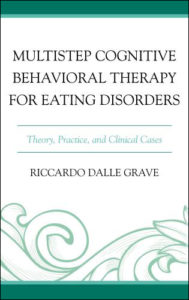Author Riccardo Dalle Grave (Villa Garda Hospital – Garda -Vr – Italy)
Publisher Jason Aroson: Lanham • Boulder • New York • Toronto • Plymouth, UK, 2013
Multistep Cognitive Behavioral Therapy for Eating Disorders: Theory, Practice, and Clinical Cases describes a novel model of cognitive behavior therapy (CBT) for eating disorders called multistep CBT-E (Enhanced). The treatment, derived from the transdiagnostic cognitive behavior theory of eating disorders, extends the range of applicability of standard CBT-E. It is designed to be applicable to three different levels of care (outpatient, intensive outpatient, inpatient), and to eating disorder patients of all diagnostic categories, ages, and BMI categories. Distinguishing multistep CBT-E is the adoption of a multi-step approach conducted by a multidisciplinary CBT-E team including psychologists, dietitians, and physicians, the inclusion of a family module for patients under eighteen years old, and the use of assisted eating and group sessions, in adjunct to individual psychotherapy in the intensive levels of care. The first eight chapters provide an overview of eating disorders, the cognitive behavior theory of eating disorders, how to build a CBT-E multidisciplinary team, how patients are assessed and prepared for the treatment, the general organization, procedures, and strategies involved in the three steps of multistep CBT-E treatment, and how multistep CBT-E can be adapted for adolescents. In order to highlight the flexibility of the multistep CBT-E approach, Section Two of the book provides a detailed description of three treated clinical cases. The first case illustrates how outpatient CBT-E was adapted to treat a professional sportswoman affected by an eating disorder; the second describes the procedures and strategies applied in intensive outpatient CBT-E to treat a patient who did not improve with standard outpatient CBT-E; and the third case illustrates the procedures and strategies typically applied in inpatient CBT-E and shows how it can be used to help a patient with a longstanding eating disorder who has failed to respond to several outpatient treatments. Each chapter gives a general description of the case in question and details the main procedures, strategies, and tools used from the assessment stage through to discharge. In addition, abridged transcripts of relevant clinical sessions are included, to give interesting insight into the practical implementation of multistep CBT-E, and the outcomes at the end of the treatment and follow-up are reported.
Table of Contents
Introduction
Section 1. Multistep Cognitive Behavioral Therapy for Eating Disorders
Chapter 1. Eating Disorders: An Overview
Chapter 2. The Cognitive Behavioral Theory of Eating Disorders
Chapter 3. Multistep CBT-E for Eating Disorders
Chapter 4. Assessing and Preparing Patients for Multistep CBT-E
Chapter 5. Step One – Outpatient CBT-E
Chapter 6. Step 2 – Intensive Outpatient CBT-E
Chapter 7. Step 3 – Inpatient CBT-E
Chapter 8. Multistep CBT-E for Adolescents
Section 2. Case Studies
Chapter 9. Case Study A – Outpatient CBT-E
Chapter 10. Case Study B – Intensive Outpatient CBT-E
Chapter 11. Case Study C – Inpatient CBT-E
Conclusions
Appendix 1
References
Index
About the Author
Reviews
Dr. Dalle Grave has developed a thoughtful adaptation of enhanced Cognitive Behavioral Therapy, referred to as Multistep CBT, which will allow more unified and consistent treatment for individuals suffering from eating disorders across inpatient and outpatient settings. Multistep enhanced CBT for inpatient settings will allow treatment planning that is driven by a single unified theoretical model, rather than the typical eclectic approach that is more fragmented, thus representing a curial step forward in providing the optimal evidence-based care for individuals with a variety of eating disorders.
— Eric Stice, Oregon Research Institute
Riccardo Dalle Grave is one of the people I most trust to connect empirically based treatments with the management of eating disorders in clinical settings. This book is unique, and will be valuable for a wide array of professionals working in the field.
— Kelly D. Brownell, Yale University
Riccardo Dalle Grave has provided the field with a truly innovative and clinically sensitive approach to a full range of levels of care for eating disorder patients. Most notably, he carefully minds the evidence base surrounding cognitive behavior therapy-enhanced as he outlines new applications in hospital-based environments. This remarkable text most clearly speaks to Dalle grave’s strong appreciation of empirical science and his careful clinical wisdom as he strives to find effective ways to treat eating disorder patients in the greatest need.
—Stephen Wonderlich, University of North Dakota






